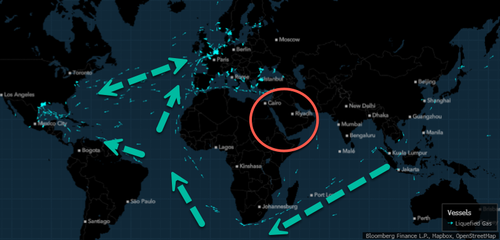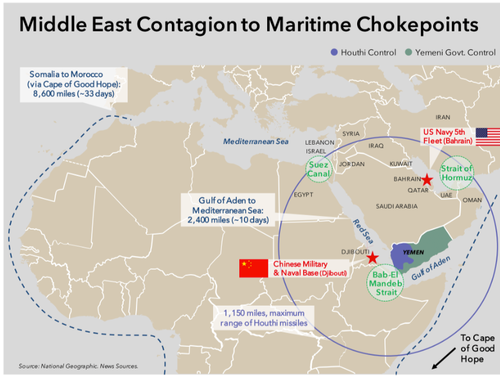
The US-led maritime coalition, Operation Prosperity Guardian, has been an utter failure in entirely securing critical shipping lanes in the southern Red Sea and deterring Iran-backed Houthis from attacking commercial vessels with drones and missiles near the Bab al-Mandab Strait.
Days ago, we reported two vessels were attacked in the southern Red Sea, with one sustaining damage.
Separate footage, timestamped April 29, shows what appears to be Houthis launching a suicide drone at a bulk carrier in the highly contested waters. The terrorist group has been targeting vessels associated with Western countries and Israel since mid-November in solidarity with Palestinians.
Footage showing a Houthi Shahab drone strike on MV Cyclades bulk carrier off Yemeni coast: pic.twitter.com/vO7VgXyABi
— Bashkarma🌏 (@Karmabash) May 1, 2024
We published a note 45 days ago titled "LNG Tankers Still Absent From Red Sea," and to this day, liquefied natural gas vessels with destinations in Europe and the US are absent from the critical shipping lane. This is a direct result of the Biden administration's weak foreign policy.
Meanwhile, late last month, 16 maritime industry associations and social partners co-signed an open letter to the UN calling for urgent assistance as maritime chokepoints were seizing up. None of this should be a surprise as the world fractures into a dangerous multi-polar state.
"If we ever have a long-term safe resolution to the Red Sea crisis, it's going to take six to 12 months before we actually have stable networks running through the Suez again," Alan Murphy, the founder of Sea-Intelligence, told Bloomberg in an interview this week.
America's ability to police the heavy seas is miserably failing. The failure of Operation Prosperity Guardian should be a wake-up call. The economics of war for the US doesn't make sense when million-dollar missiles are trying to intercept $100 drones.
The US-led maritime coalition, Operation Prosperity Guardian, has been an utter failure in entirely securing critical shipping lanes in the southern Red Sea and deterring Iran-backed Houthis from attacking commercial vessels with drones and missiles near the Bab al-Mandab Strait.
Days ago, we reported two vessels were attacked in the southern Red Sea, with one sustaining damage.
Separate footage, timestamped April 29, shows what appears to be Houthis launching a suicide drone at a bulk carrier in the highly contested waters. The terrorist group has been targeting vessels associated with Western countries and Israel since mid-November in solidarity with Palestinians.
Footage showing a Houthi Shahab drone strike on MV Cyclades bulk carrier off Yemeni coast: pic.twitter.com/vO7VgXyABi
— Bashkarma🌏 (@Karmabash) May 1, 2024
We published a note 45 days ago titled “LNG Tankers Still Absent From Red Sea,” and to this day, liquefied natural gas vessels with destinations in Europe and the US are absent from the critical shipping lane. This is a direct result of the Biden administration’s weak foreign policy.
Meanwhile, late last month, 16 maritime industry associations and social partners co-signed an open letter to the UN calling for urgent assistance as maritime chokepoints were seizing up. None of this should be a surprise as the world fractures into a dangerous multi-polar state.
“If we ever have a long-term safe resolution to the Red Sea crisis, it’s going to take six to 12 months before we actually have stable networks running through the Suez again,” Alan Murphy, the founder of Sea-Intelligence, told Bloomberg in an interview this week.
America’s ability to police the heavy seas is miserably failing. The failure of Operation Prosperity Guardian should be a wake-up call. The economics of war for the US doesn’t make sense when million-dollar missiles are trying to intercept $100 drones.
Loading…






